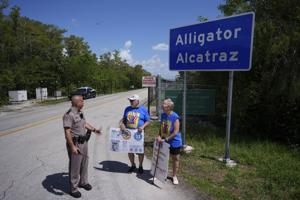Entertainment
DeSantis Faces Funding Dilemma Over Controversial Detention Center

Florida Governor Ron DeSantis is grappling with a significant funding dilemma regarding the immigration detention center dubbed “Alligator Alcatraz” located in the Florida Everglades. A recent ruling from an appellate court has temporarily blocked a lower court’s order that required the governor’s administration to cease operations at the facility, but the decision has introduced complications surrounding federal funding.
The appellate panel ruled that the facility currently does not need to undergo a federally mandated environmental impact study, primarily because Florida has not yet received promised federal funding for its construction. However, accepting federal reimbursement could require an environmental review, which could jeopardize the center’s operations. The judges emphasized in their 2-to-1 decision that since no federal money has been allocated, the project does not constitute a “major federal project,” thus exempting it from the environmental review.
U.S. Homeland Security Secretary Kristi Noem indicated on social media earlier this summer that the facility would largely be funded through FEMA‘s shelter and services program. The appellate court noted that the law specifies that “the absence of federal funding renders an action ‘non-federal’” and not subject to environmental scrutiny.
The recent ruling has stayed a preliminary injunction issued by U.S. District Judge Kathleen Williams, which mandated the detention facility to wind down operations by late October 2023 while legal proceedings continued. The stay will remain in effect pending an appeal.
In response to inquiries about whether the appellate decision would impact the state’s application for federal funding, the governor’s office did not provide a direct answer. Instead, press secretary Molly Best shared video clips of DeSantis discussing “Alligator Alcatraz,” but funding specifics were not addressed.
The facility was constructed rapidly in late June on an isolated airstrip surrounded by wetlands, aiming to support former President Donald Trump’s immigration enforcement initiatives. Trump visited the site in July, suggesting it could serve as a model for similar facilities across the nation, as his administration sought to bolster deportation infrastructure. Since then, other states have announced plans to establish their own immigration detention centers.
The ongoing environmental lawsuit is one of three federal challenges to operations at the detention center. A second immigration detention facility recently opened in north Florida, utilizing a closed prison. Paul Schwiep, an attorney representing Friends of the Everglades, an environmental group involved in the lawsuit, expressed concerns that Florida taxpayers should not finance federal immigration services. He highlighted Judge Williams’ belief that the federal government would fund the facility’s operations, a notion the appellate panel appeared to question.
Elise Bennett, a senior attorney for the Center for Biological Diversity, another plaintiff in the lawsuit, pointed out the ruling may allow the DeSantis administration and the Department of Homeland Security to benefit from federal funding without immediate accountability. She noted that the appellate majority’s stance could enable a federal agency to withhold reimbursement until project completion, potentially resulting in environmental damage before any analysis occurs.
As the situation develops, Florida’s approach to immigration detention and environmental protection remains under scrutiny, revealing the complexities at the intersection of state and federal policies.
-

 World3 months ago
World3 months agoScientists Unearth Ancient Antarctic Ice to Unlock Climate Secrets
-

 Entertainment3 months ago
Entertainment3 months agoTrump and McCormick to Announce $70 Billion Energy Investments
-

 Lifestyle3 months ago
Lifestyle3 months agoTransLink Launches Food Truck Program to Boost Revenue in Vancouver
-

 Science3 months ago
Science3 months agoFour Astronauts Return to Earth After International Space Station Mission
-

 Technology2 months ago
Technology2 months agoApple Notes Enhances Functionality with Markdown Support in macOS 26
-

 Top Stories2 weeks ago
Top Stories2 weeks agoUrgent Update: Fatal Crash on Highway 99 Claims Life of Pitt Meadows Man
-

 Sports3 months ago
Sports3 months agoSearch Underway for Missing Hunter Amid Hokkaido Bear Emergency
-

 Politics3 months ago
Politics3 months agoUkrainian Tennis Star Elina Svitolina Faces Death Threats Online
-

 Technology3 months ago
Technology3 months agoFrosthaven Launches Early Access on July 31, 2025
-

 Politics3 months ago
Politics3 months agoCarney Engages First Nations Leaders at Development Law Summit
-

 Entertainment3 months ago
Entertainment3 months agoCalgary Theatre Troupe Revives Magic at Winnipeg Fringe Festival
-

 Politics2 weeks ago
Politics2 weeks agoShutdown Reflects Democratic Struggles Amid Economic Concerns

















